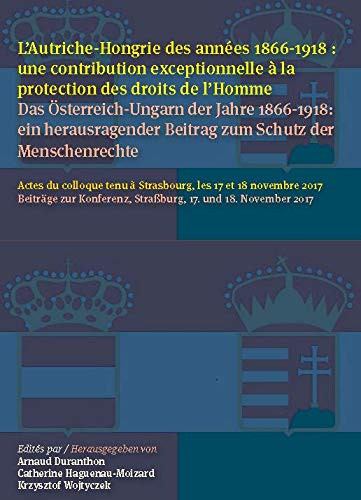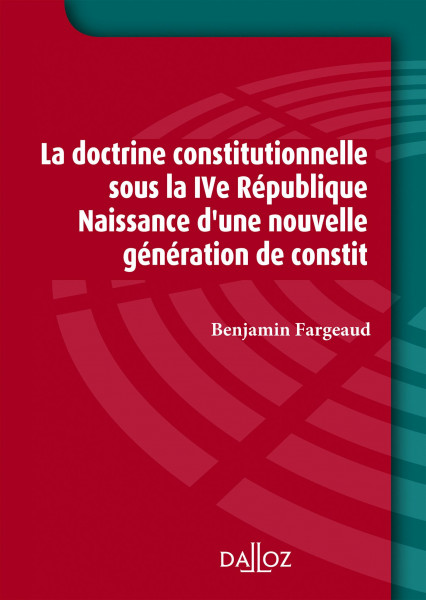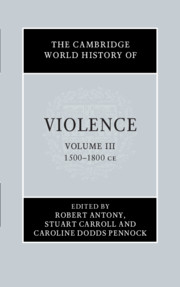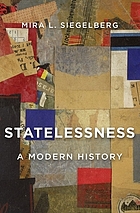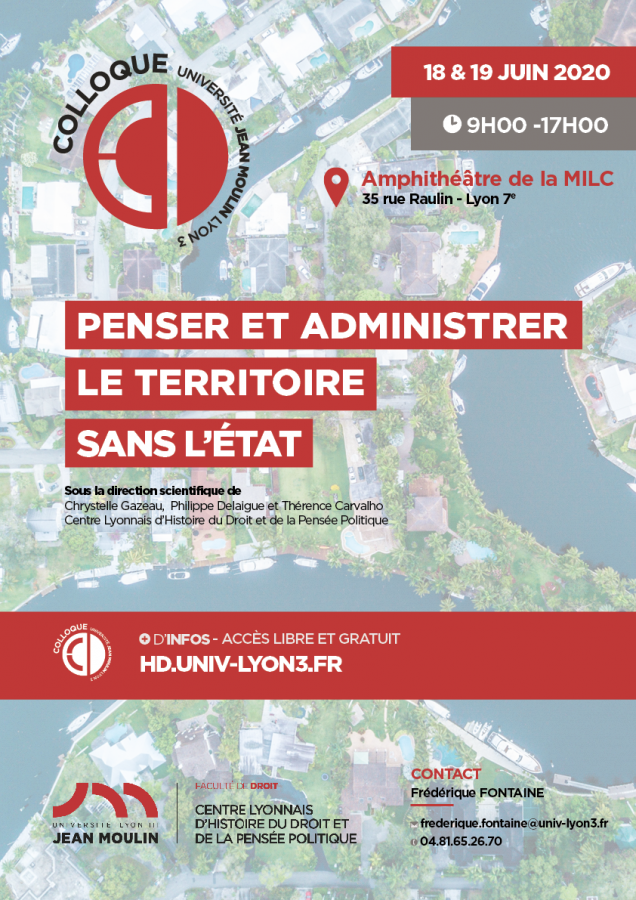Program:
Programme
Jeudi 18 juin 2020
9h00 : Accueil des participants
I. Aux marges de la souveraineté
Thème 1 – Administrer le territoire loin du pouvoir central
Sous la présidence de Nicole Dockès, Professeur émérite, Université Jean Moulin Lyon 3
9h40 :
Contourner l’État dans l’administration provinciale au Bas-Empire romainChristian Bruschi, Professeur émérite, Aix-Marseille Université
10h00 : L’Administration des territoires français en Inde face aux reculs de l’État : contraintes juridiques et économiques aux marges du Premier empire colonialClovis Bernardi, Doctorant, Université Jean Moulin Lyon 3
10h20 : Le pouvoir des gouverneurs généraux en matière d’accès à la citoyenneté des indigènes de l’Afrique Occidentale FrançaiseSarah Rahouadj, Doctorante, Aix-Marseille Université
10h40 :
Administrer le territoire en marchand. L’aventure des Stroganov au XVIe siècle
Sébastien Le Gal, Professeur, Université Grenoble Alpes
11h00 : Discussion – Pause
Thème 2 – Sécuriser le territoire sans l’État
11h20 :
Défendre le territoire sans l’ÉtatPaul Chauvin-Hameau, Maître de conférences, Université de Tours François Rabelais
11h40 : L’administration des confins asiatiques de l’empire colonial français. Le cas de l’étude du maintien de l’ordre aux frontières entre Chine et TonkinJohann Grémont, Docteur en histoire et chercheur associé, Institut Français de Recherche sur l’Asie de l’Est
12h00 : La protection du territoire national sans l’État ? Recherche sur les « abandons » de l’État en matière de sécurité publique
Héritage Bita Heyeghe, Doctorant, Université de Lorraine
12h40 : Discussion
13h00 : Pause déjeuner
II. Aux limites de l'action publique
Thème 3 – Administrer la question sociale au-delà de l’État
14h20 :
Le logement des pauvres au XIXe siècle : une compétence délaissée par les pouvoirs publicsPierre Belda, Maître de conférences, Université d’Orléans
14h40 :
Penser et administrer la question sociale par la commune : types et pratiques des différents courants du « socialisme municipal »
Jérôme Henning, Maître de conférences, Université Paris Nanterre
15h00 : L’économie sociale et solidaire, de nouveaux outils au service de la solidarité dans les territoiresCharlotte Gustave-Huteau, Docteur en droit et chercheuse associée, Université de La Rochelle
15h20 : Discussion – Pause
Thème 4 – Abandonner le territoire au secteur privé
15h40 : La privatisation extrême : l’entreprise en tant qu’autorité territorialeMichael J. Strauss, Professeur, Centre d’Études Diplomatiques et Stratégique de Paris
16h00 : Les quartiers résidentiels fermés aux États-UnisMathilde Laporte, Doctorante, Université Paris II Panthéon-Assas
16h20 : Lorsque les sociétés privées deviennent propriétaires des villes. Étude de cas : la cité Al-Rehab en ÉgypteSami Sérageldin, Conseiller d’État en Égypte
16h40 : Discussion
17h00 : Fin de la 1ère journée
Vendredi 19 juin 2020
Thème 5 – Penser le droit face au retrait de l’État
9h20 : La « question finlandaise », illustration doctrinale de la difficulté de penser le territoire sans l’ÉtatÉlise Fraysse, Docteur en droit, Université Jean Moulin-Lyon 3
9h40 : L’administration du territoire sans l’État et le droit administratif globalRaphaël Maurel, Doctorant, Université Clermont Auvergne
10h00 :
L’Union Européenne, instrument régional de retrait volontaire de l’État
Efthymia Lekkou, Maître de conférences, Université Jean Moulin-Lyon 3
10h20 :
Les conseils d’arrondissement : 140 ans de solitudeMarie-Odile Nicoud, Maître de conférences, Université Lumière Lyon 2
10h40 : Discussion – Pause
III. Au crépuscule de l'état
Thème 6 – Imaginer un nouveau territoire : expérimentations et projections
Sous la présidence d’
Anthony Mergey, Professeur Université Paris II Panthéon-Assas
11h00 :
Le Marquis d’Argenson et les petites Républiques à partir de son expérience dans le HainautAnne Dobigny-Reverso, Maître de conférences, Université d’Angers
11h20 : Les « dernières convulsions du moribond » : construire et organiser les ultimes communautés icariennes aux États-Unis d’Amérique, 1878-1898Étienne Lamarche, Doctorant, Université Paris Nanterre
11h40 : La renaissance de la cité idéale. Oubli de la ville étatique et élan du micro-fief urbain dans le monde contemporain. Origines et développements
Sonia Scognamiglio, Professeur, Université Naples Parthénope
12h00 : Discussion
12h20 : Pause déjeuner
Thème 7 – Rompre avec l’État
14h20 : Le Pays Basque : comparaison des stratégies politiques et moyens juridiques d’affaiblissement du rôle de l’État en France et en Espagne
Pierre Barillé, Doctorant, Université de Bordeaux
14h40 :
Penser et administrer le territoire sans l’État. Perspectives anarchistes, de P.-J. Proudhon à J. C. ScottAnne-Sophie Chambost, Professeur, Université Jean Monnet Saint-Etienne
15h00 :
Penser et administrer sans l’État : un rêve mafieux ?
Jacques de Saint-Victor, Professeur, Université Sorbonne Paris Nord
15h20 : Discussion – Pause
Thème 8 – Administrer lorsque l’État s’effondre
Sous la présidence de Florent Garnier, Professeur, Université Toulouse 1 Capitole
15h40 :
Administrer après l’effondrement de l’État. Réflexions à partir du cas des premières décennies de l’an mil
Laura Viaut, Maître de conférences, Université Paris 1 Panthéon-Sorbonne
16h00 : De la crise de l’État au démantèlement de la civilisation étatique. Quand l’historiographie fait l’HistoireFrancesco Di Donato, Professeur, Université Naples Parthénope
16h20 : Discussion, conclusion
17h00 : Clôture du colloque
More information on the conference
website.






